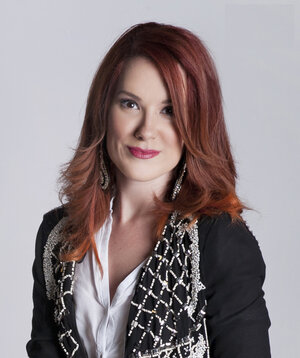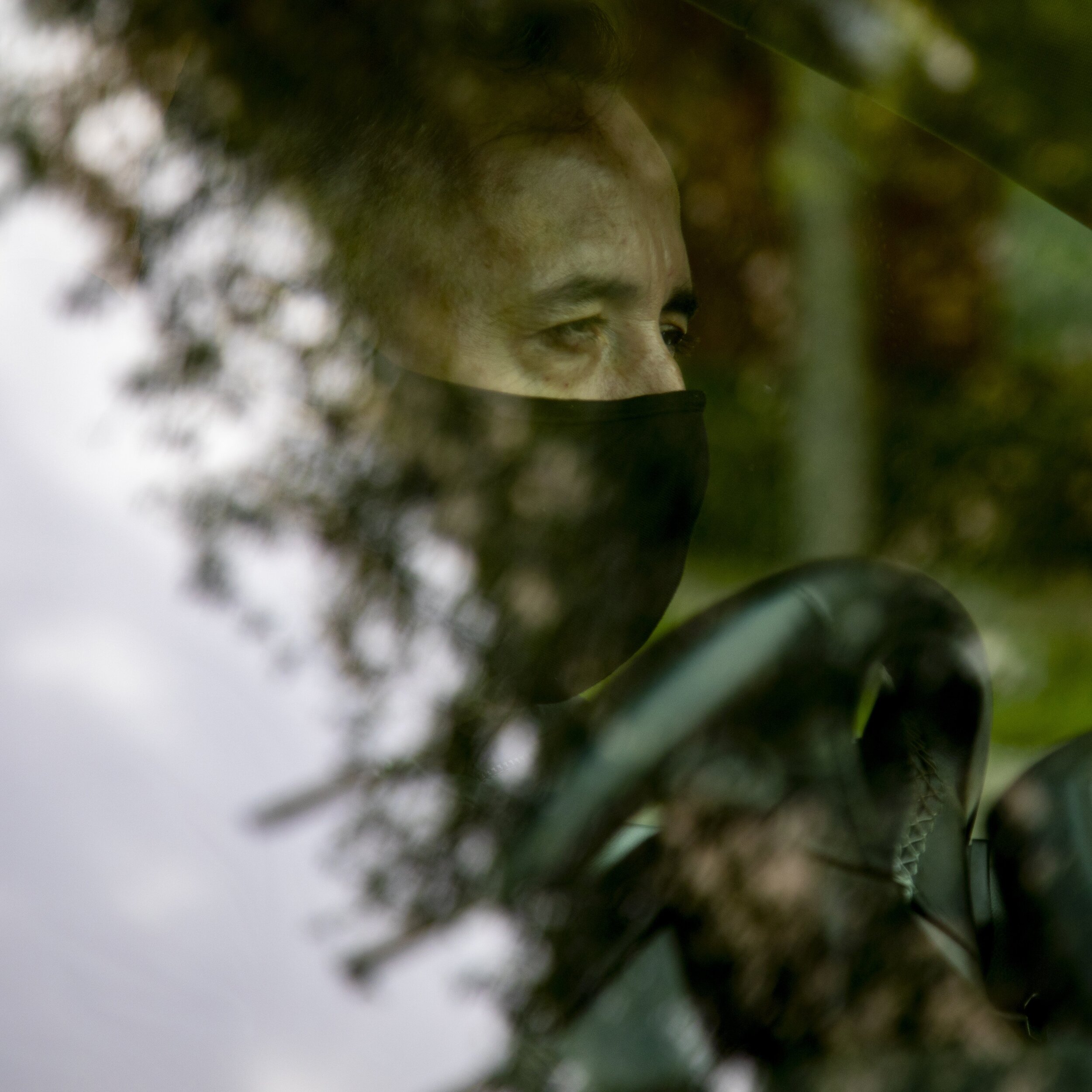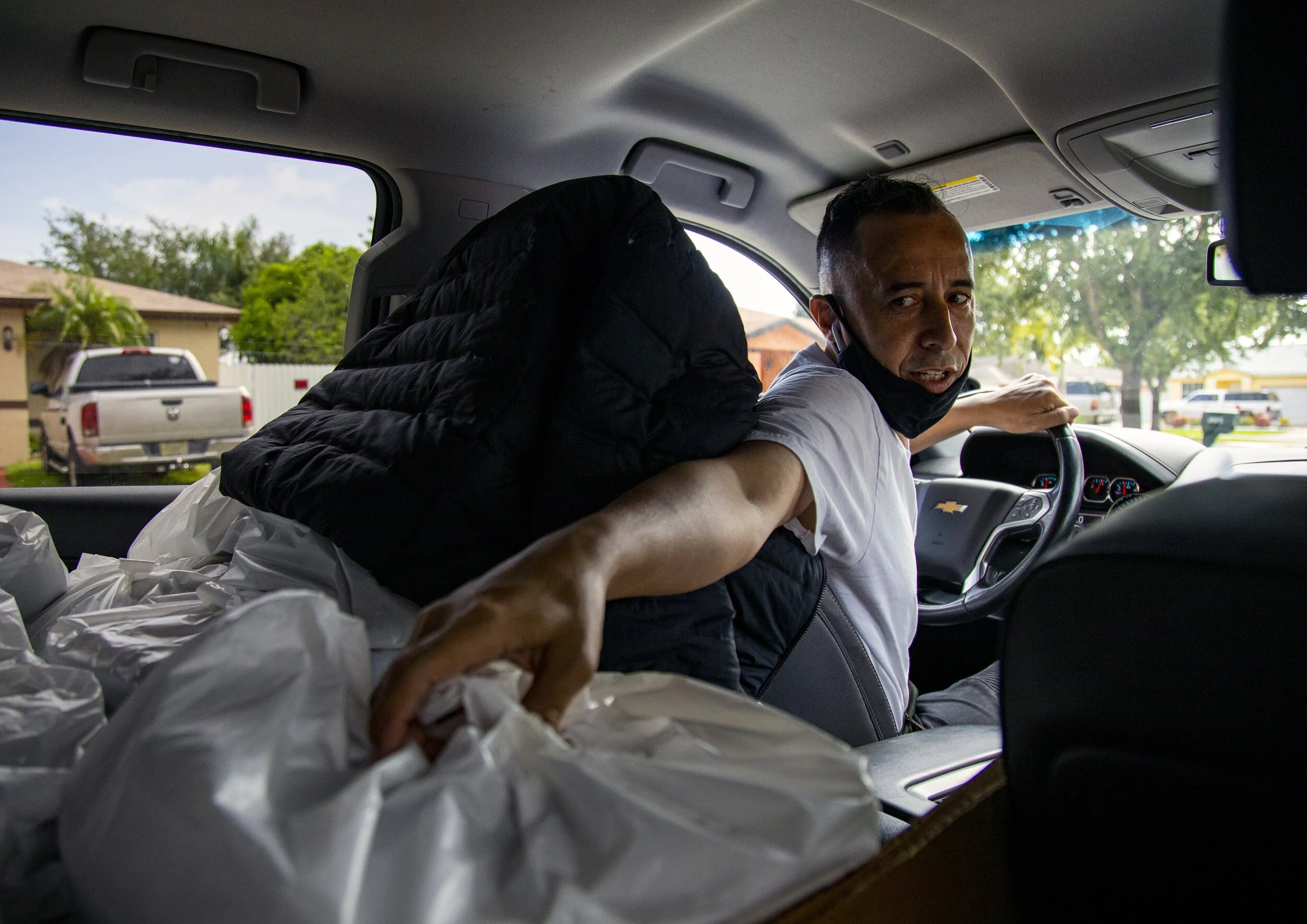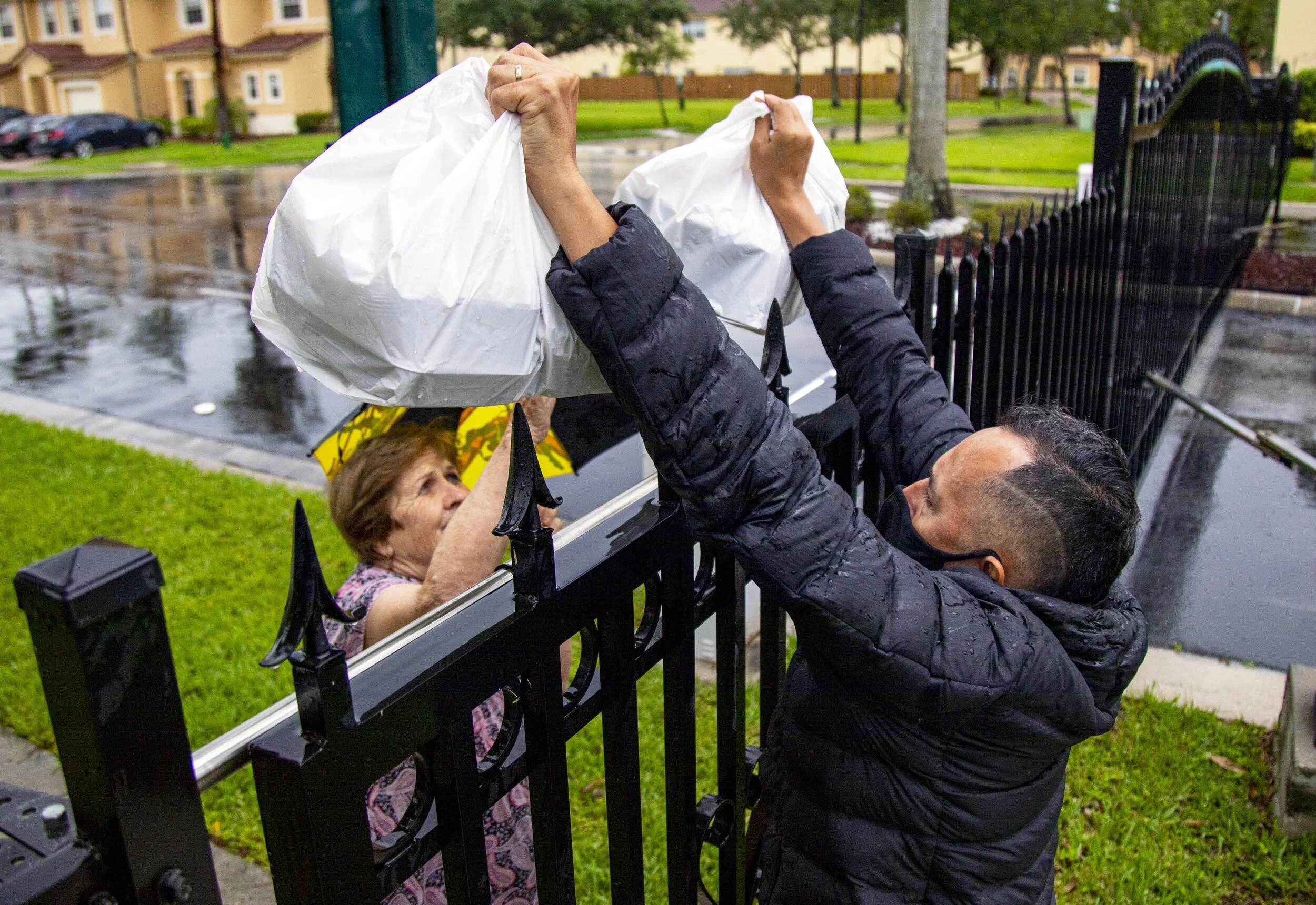Gaming The System: Seeking asylum in the time of Trump
Julio Rodriguez was a successful comedian in Colombia, until he became politically incorrect. Today he faces a U.S. asylum system that's become difficult for applicants without money or connections. Illustration by Megan Moulos
Asylum application fees have jumped and protections chipped away. Critics say the Trump administration wants to discourage immigrants. For those with money and connections, the changes aren’t barriers. But Julio Rodriguez has neither, living day-to-day and hoping he can stay safe in Miami
Editor’s Note: This report, the third of four published in palabra., is the result of a fellowship funded by the Fund for Investigative Journalism in partnership with the National Association of Hispanic Journalists and el Nuevo Herald of Miami.
This series first appeared in the Miami Herald.
The Spanish version, Jugando Con El Sistema, can be found it its entirety at el Nuevo Herald
This could finally be the break he’d been waiting for all along.
Or so he thought.
Sitting in the makeup chair at Mega TV studios in Miami, Julio Rodríguez rehearsed his lines. Dressed in an all-white costume, sporting a ponytail and what looked like love beads, he was ready to portray a minister in a racy TV interview. He watched the clock closely. Soon he’d need to get to his other gig. It was a month before the coronavirus turned life inside out.
That other job was driving people around Miami in a black Tahoe. The ride-share job took him to the beach, the bodega, the bar and the after-hours strip club.
Miami is many different worlds. For an Uber driver who must make $1,000 a week to cover his car payment -- which carries a 24% interest rate because of his immigration status -- and maintain insurance and put food on the table, Miami can be a scary ride.
Rodríguez is an asylum seeker. In 2016, he left behind a 20-year entertainment career in Colombia after receiving death threats when his comedy routine became, in the literal and potentially deadly sense, politically incorrect.
“I had to do it for my family,” Rodríguez said.
The Trump administration has made at least 50 policy changes and major announcements aimed at jacking up fees, chipping away at protections and doing everything possible to discourage all immigrants from making the journey.
Some of the measures can be circumvented if one has the money and connections.
Rodríguez has neither. He lives a day-to-day existence, a canary in a tropical coal mine.
Asylum seeker Julio Rodriguez gets by as a ride-share driver in Miami. Photo courtesy of eNH
Play the Game
Have you ever wondered how the immigration system works for different people? Take your shot and play the game.
A DUAL SYSTEM
Visualization by: Romina Ruiz-Goiriena and Nathaniel Levine
Click here to see the advantages that wealthy expatriates from Latin America enjoy over other immigrants. To protect and manage their assets and immigration status, they can avail themselves of a constellation of highly regarded lawyers, as well as real estate agents and other service providers, along with LLCs created with relatives. Unless specifically indicated in pop-up descriptions, nothing in this graphic is meant to connote illegality, only connections.
2016 - A time of turmoil
Rodríguez arrived at Miami International Airport with his wife and two young daughters on the day before Halloween. His life was in turmoil. He went from performing in productions across Bogotá — live improv shows and appearances on Colombia’s most important weekly comedy show, “Sábados Felices” (Happy Saturdays) — to fearing for the lives of his family.
“I came out of the club where I had performed that night and I found the typed death threat on my car window,” the 46-year-old told the Miami Herald. “I don’t remember how I drove home.”
He scrambled to apply for tourist visas — long since expired — and fled to the United States.
“I didn’t know if we’d stay in the United States. But we couldn’t stay in Colombia,” he said of his homeland, then presided over by Juan Manuel Santos.
A week after Rodríguez landed in Miami, Donald J. Trump was elected president. His pledge to build a “great, great wall” had become a conservative cri de coeur, a passionate appeal ushering in an America-first administration determined to exclude outsiders who were once welcomed.
“This administration continues to find new and cruel ways to deny asylum seekers their most basic rights,” said Dennise Moreno, an Equal Justice Works Fellow at the Asylum Seeker Advocacy Project (ASAP).
2017 - Welcome to Miami
Miami-Dade County has long been known for welcoming outsiders and celebrating diversity. It was a “sanctuary city” — one that limited cooperation with federal efforts to enforce immigration laws. With a new president in the White House, that designation carried consequences for Republican Mayor Carlos Gimenez. On Jan. 25, five days into his presidency, Trump signed an executive order to withhold some federal funding from such cities. While other communities resisted, Gimenez capitulated.
Two days after that executive order, the president signed another. That one imposed a 90-day halt on people from seven predominantly Muslim countries from visiting the United States. The policy was effective the next day. That quick turnaround, and an indefinite ban on all Syrian refugees, unleashed lawsuits and airport chaos.
Amid all that, on Feb. 9, 2017, the Rodríguez family filed its asylum claim. The wait began.
“I asked other comedians and artists who had also filed for asylum for help,” said Rodríguez, whose family couldn’t afford to avail itself of the lawyers and real estate agents who cater to wealthy foreign nationals. “They recommended a paralegal who wouldn’t be too expensive to help us.”
The family was able to sell a health food store in Bogotá to stay afloat. Rodríguez, his wife and two daughters took up residence in a Kendall apartment. Their eldest daughter enrolled in school. Rodríguez scrimped.
In April, Rodríguez found himself inside a local U.S. Citizenship and Immigration Services office for the first time. They took his fingerprints. That was all. Despite the dread felt by many with expired visas — his expired on April 29, 2017 — he hasn’t been called back.
Under rules in place at the time — but no more — asylum seekers could apply for a work permit after 150 days and be granted one in 30 days. Even then, Rodríguez faced delays. His work permit took 219 days and arrived in November 2017.
A friend managed to get him a cash gig detailing cars by the airport.
He checked his mailbox daily for notification for his “credible fear” interview. That’s when asylum seekers can demonstrate a legitimate fear of persecution if returned to their native country. Nothing.
When the laughter stopped
Back in Colombia, Rodríguez was known as “el nene,” a term of endearment for males. Unlike more traditional comics in Latin America, he generally didn’t dress up as spoof characters and deliver cliché punch lines. He wasn’t into slapstick. Rodríguez was a contrarian, who wore dark jeans, a leather jacket and one of his many rock ‘n’ roll T-shirts. this is our T-shirt style
He would harshly criticize Álvaro Uribe, Santos’ predecessor as president, accusing him of ruining the country, saying it’s overrun by drug kingpins who had infiltrated the government.
And yet, according to his asylum application, he twice voted for Uribe, who was recently released from house arrest amid bribery allegations.
After a member of the army caught one of Rodríguez’s performances, he summoned the comic to his office at the Colombian School of Intelligence and Counterintelligence. The colonel made him an offer: “Come teach character development and characterization to the cadets.”
He accepted the job, which consisted of teaching cadets how to successfully use theatrical skills while deployed on covert assignments. He became a popular figure, winning teacher of the year.
According to a Colombian Ministry of Defense spokesperson, Rodríguez worked at the military school from 2014 until the fall of 2016.
A bit over a month before Rodríguez’s departure, his wife received the first threatening phone call.
A week later, Rodríguez got a call himself. The male voice made clear he knew Rodríguez’s daily routine, including school pickup and drop-off times.
Then came the note allegedly signed by the National Liberation Army, or ELN, the country’s leftist guerrillas. The copy provided to the Herald accused Rodríguez of “directly collaborating with intelligence operations,” which led to the “deaths of many comrades.”
Rodríguez wrote in his asylum application that his work with the army had made him a rebel target — ironic, considering his comedy riffed off his criticism of the government.
There are currently 2,650 asylum seekers from Colombia. According to the most recently available data, 370 have been approved.
After Rodríguez made his way to Miami, the Trump administration quietly tightened restrictions — so much so that were he to try to come to the United States today as an asylum seeker he would almost certainly be turned away on the spot.
2018 - Last in, first out
In January, the administration announced a new “last in, first out” policy. The purpose: to clear the backlog of asylum requests by moving recent arrivals to the front of the line for processing. This, it was believed, would remove an incentive for coming to the country by preventing newly arrived undocumented immigrants and asylum seekers from running out the clock.
On April 2, the administration took an added step. Upset with a growing backlog of cases involving people like Rodríguez, the Justice Department announced a quota for immigration judges: close out 700 cases per year. Critics said that kind of mandate would make it impossible for defendants to gather material to support their cases.
On June 11 came an ominous (for Rodríguez) announcement, this one from then-Attorney General Jeff Sessions. He said individuals who are victims of “private crime, including domestic and gang violence, in their home country will no longer automatically qualify for U.S. asylum.”
Although the State Department has said Colombia’s guerrillas commit some of the worst abuses, including “political killings; killings of members of the public security forces and local officials” and widespread use of “kidnappings and forced disappearances,” that sort of criminal activity was no longer enough to sustain an asylum claim.
“Our nation’s immigration laws provide for asylum to be granted to individuals who have been persecuted, or who have a well-founded fear of persecution, on account of their membership in a ‘particular social group,’ but most victims of personal crimes do not fit this definition — no matter how vile and reprehensible the crime perpetrated against them,” Sessions said. (A federal judge later blocked the move.)
Living in limbo — waiting for action by immigration officials — has limited Rodríguez’s options. He left family members behind in Colombia whom he can’t see if they fall ill.
“My biggest worry is my family back in Colombia. My father is aging. My wife’s grandmother is still alive,” Rodríguez said. “The worst part is not being able to see them, in a different country, to think something could happen and we didn’t get to see them in time.”
He likened it to his life being “frozen.“
As he navigates the difficult asylum system, Julio Rodriguez spends time delivering food for a COVID relief group. Photo Courtesy of eNH
JULY 2019 - A growing backlog and COVID-19
Then-acting Department of Homeland Security Secretary Kevin McAleenan negotiated a series of agreements with governments from Guatemala, Honduras and El Salvador, aka the Northern Triangle. They required migrants to apply for asylum in the first country they entered on their route, allowing the United States to summarily turn them away, cutting off one more way into the country.
Since the agreements are not considered treaties, they did not require congressional approval.
These provisions would keep thousands of Cubans and Venezuelans in Mexico as well.
A leaked memo showed how United States Citizenship and Immigration Services (USCIS) Deputy Director Mark Koumans encouraged agency employees to help Immigration and Customs Enforcement (ICE) with its caseload, instead of processing green cards, work visas, and citizenship applications. This added red tape on people like Rodríguez. Result: By the end of fiscal year 2019, the backlog of all immigration court cases, including asylum, was over 869,000. COVID-19 has only made it worse. The new tally is over 1.1. million, according to the State Department.
February 2020 - Sticker shock for asylum seekers
The Justice Department announced a series of planned fee hikes, including one raising the cost of a work permit application for asylum seekers from $0 to $490, and tacking on an unprecedented $50 fee to have their cases heard in court.
Only three other countries charge fees for asylum applications: Iran, Fiji and Australia. In addition, the administration raised fees for other services, such as appealing deportation orders, and the processing of green card and citizenship applications.
James McHenry, director of the Executive Office for Immigration Review, the Department of Justice agency that runs immigration courts, called the fee hikes “marginal.” Rodríguez is due to renew his work permit on Dec. 9, 2021.
He’ll have to cough up a whopping $1,470. This time, he’ll also have to pay for his eldest daughter’s permit as well. She turns 18 next July.
(A U.S. district judge in California granted a preliminary injunction in September temporarily halting implementation of the new fees due to start this month.)
Potentially worse for Rodríguez is an administration decision to broaden a 19th century provision known as the “public charge rule.” This change was aimed at denying green cards to immigrants who might seek future government assistance.
(While the Department of Homeland Security has suggested this rule will not apply to asylum seekers, nobody really knows.)
Rodríguez remained hopeful.
The family still lived in a two-bedroom apartment in West Kendall. His wife now worked as a manager at a local restaurant. Between the two paychecks, Rodríguez and his wife were getting by.
Rodríguez still harbored his dream of performing. Miami Improv had one night a week for Spanish-language performances. Rodríguez began performing. And he launched a podcast, called “Amnesia.” He even gave a short performance on a scripted series for Univision.
But it wasn’t enough to forgo the Uber.
“Esta es una ciudad difícil,” Rodríguez said. Translated: It’s a tough town.
Finally, he got a break, landing a role on “El Show de Alexis Valdes,” a satire program similar to “The Daily Show” or “Colbert Report.”
Rodríguez was a smash.
Then the novel coronavirus hit.
March and April 2020 -- COVID cancels everything
Everything was canceled — including Rodríguez.
No more stand-up opportunities. Businesses were ordered to shut. The restaurant that employed his wife, like every other restaurant, was put on lockdown. The Uber job dried up.
The only thing that didn’t stop: the bills, including that $800 car payment with the crushing 24% interest rate.
Although the county halted evictions, management still expected its money.
Then Valdes’ show was put on indefinite hiatus.
Because everyone had a Social Security number, Rodríguez and his wife, who pay taxes just like citizens, qualified for a stimulus check. They didn’t cash it, fearful the government would want it back.
In April, the administration “paused” legal immigration. The measure suspended almost all visa programs and the Diversity Visa Lottery, which issues 50,000 green cards annually. Legal permanent residents were barred from trying to bring their spouses and children into the country. USCIS facilities and U.S. consulates were closed due to the pandemic.
Then he got the call. A new gig.
Ride-share driver. Part-time actor. Food delivery. Julio Rodriguez says he has to keep working while authorities his asylum application makes its way through an increasingly difficult system.
Today - Life in limbo
His alarm goes off at 5 a.m. He gets dressed, puts on a mask and drives to a food distribution center in Hallandale Beach.
As he waits in the parking lot, vans are loaded with hundreds of meals. With food kitchens strained and some senior centers shuttered, the county’s poorest and frailest need meals. Those meals won’t deliver themselves.
Rodríguez waits in line with the backup drivers at Lean Delivery. He’s been lucky so far. For eight straight days, he’s been able to sub for an absent driver. He loads 120 meals into the back of the Tahoe, transformed from Uber to a form of “meals on wheels.”
People are waiting outside when he arrives.
“God bless you,” one tells Rodríguez.
The Migration Policy Institute estimates six million immigrants work occupations in healthcare, food production and gig economy jobs — front-line positions where the risk of exposure to the coronavirus is heightened.
Meanwhile, immigration restrictions keep ratcheting tighter. Under a new rule Florida quietly put in place, those facing deportation must present an unexpired passport and an I-94 form, the federal document proving they entered the U.S. legally. Rodríguez wasn’t immediately affected but he could be at renewal time.
Thus far, he has had to renew his driver’s license twice, each time showing proof of being paroled in the United States. His next renewal date is Nov. 14, 11 days after the general election.
Another change will have a huge impact in the future: The administration increased the wait time for an asylum seeker to seek a work permit from 150 days to one year unless you meet an “extraordinary exception,” whatever that might be.
Any work permit application filed by an asylum seeker can be denied if there were any administrative issues pending — including a typo or not filling in a middle name ... because you don’t have one.
If an asylum application is denied, it will also automatically cancel the work permit even if it’s before the expiration date.
“We’re at the mercy of anything changing overnight,” Rodríguez said. “Just because we are OK today, doesn’t mean we will tomorrow.”
Rodríguez has begun streaming a YouTube show, whose name is a crude anatomically inspired pun referring to a political insurrection, from his teenage daughter’s bedroom. It’s not the big time, but it’s something.
“Everyone believes this city is cosmopolitan, with only beautiful people like Miami Beach, Brickell, Wynwood. We think it’s only art, Ultra, Key Biscayne. But, in reality, there’s also a lot of poverty, more than one imagines,” Rodríguez says.
“Sometimes I feel like I never left Colombia.”
---
Fabio Posada, a freelance investigative journalist reported from Cali, Colombia. Miami Herald Immigration Reporter Monique O. Madan contributed to this story.
—
Romina Ruiz-Goiriena is a multimedia journalist and producer. She covers politics and immigration issues and has worked in Paris, Cuba, and Israel for France24, El Mundo, and Haaretz. In 2016 she co-founded Barrio, a digital news outlet that sought to make political news more accessible to Latinos. Previously, she worked in Guatemala and Central America for CNN and The Associated Press.







